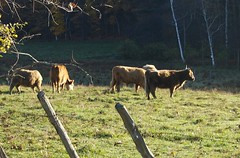
In an American Prospect article, Are Cows Worse Than Cars?, Ben Adler asks whether our dining decisions are as important as our mode of transportation and our heating fuel when it comes to reversing climate change. Animal agriculture has profound consequences environmentally, but the defensiveness of meat eaters makes the issue almost impossible to discuss in a rational way.
Perhaps even more so than cars, meat is deeply embedded in American culture. Apple pie may be the quintessential American food, but McDonald's hamburgers aren't far behind. We carve turkey on Thanksgiving and host Fourth of July barbeques. Without meat, how do you know it's a meal? To most Americans, veggies and tofu are a laughable substitute. "It was a reaction to the '60s hippie cooking that gave this important idea of vegetarianism a bad name," says Alice Waters, the chef and author who is widely credited with creating the organic-food revolution. Environmentalists, who know they must change the stereotype that they are all either tree-hugging radicals or self-righteous scolds, may be reluctant to embrace vegetarianism because of those easily caricatured cultural connotations.
Choosing what to eat is among the most personal of decisions , but unfortunately it's a decision made by most with a complete disregard for the consequences of animal agriculture.
"I think it's amazing that even the greenest of green liberal environment activists, the vast majority of them tend to consume meat at the same rate as people who think global warming is a hoax," says Mike Tidwell, director of the Chesapeake Climate Action Network. "Meat consumption seems to be the last thing that progressive people address in their lifestyle. If I had a nickel for every global warming conference that had roast beef on the menu, I'd be rich."